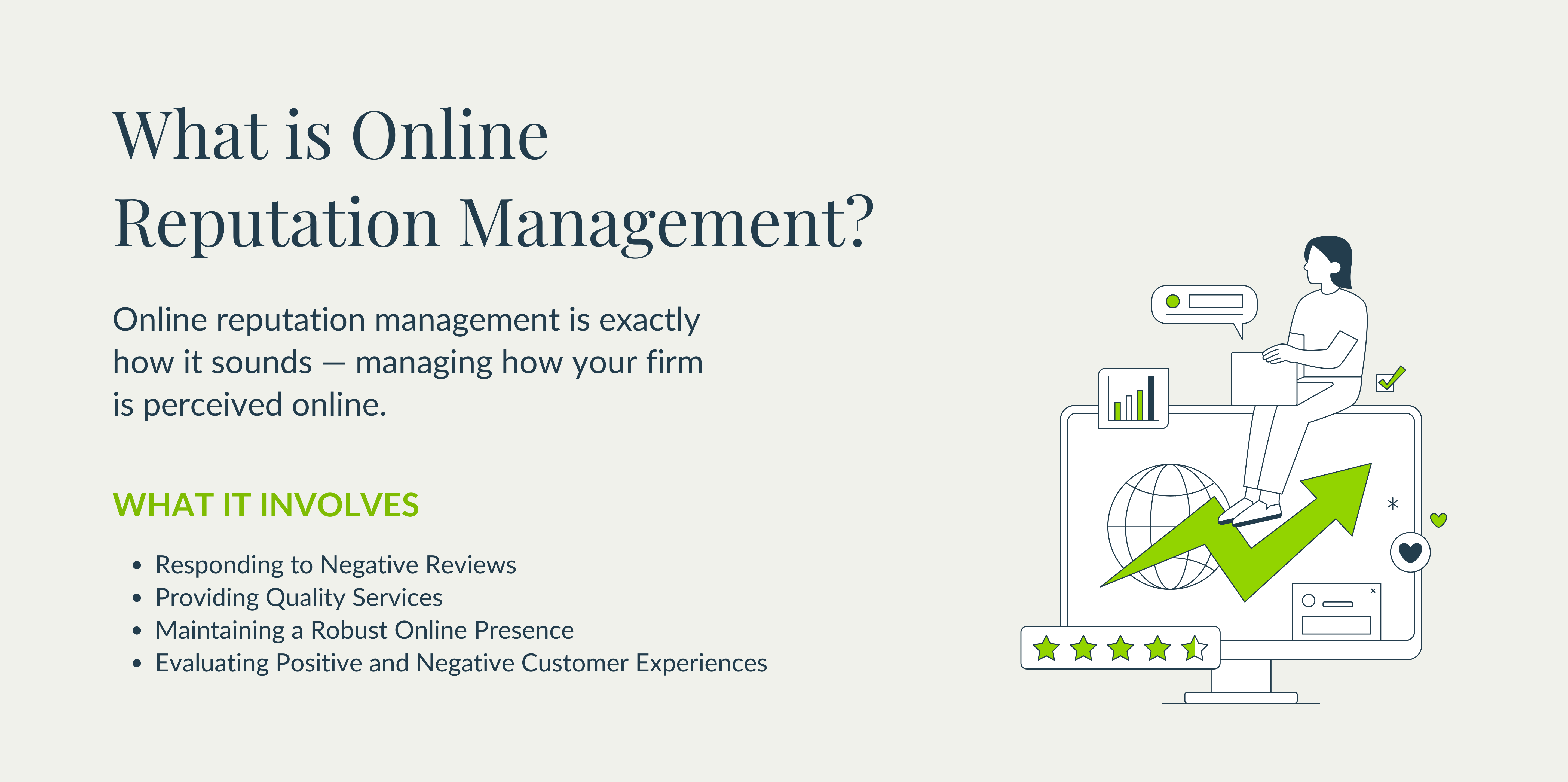Branding, Digital Marketing

Your law firm’s reputation is everything. Historically, you might have been able to rely on referrals and word of mouth. Rarely was a bad review easy for a potential client to find. Now, clients can broadcast their feelings toward your firm online for anyone to see. If you let it, a poor review can break your business. However, if you proactively manage your online reputation, you can ensure that potential clients see you in a positive light and hire your law firm over another.
What is Online Reputation Management?
Online reputation management is exactly how it sounds — managing how your law firm is perceived online. This involves establishing and maintaining a robust online presence, responding to negative reviews, and providing quality services. As a business owner, it’s important to understand what people are saying about your firm online, evaluate whether past clients had a positive or negative experience, and develop the best course of action to correct any issues.
Why is This Vital to Your Firm’s Success?
You might have a strong reputation with clients or colleagues, but it’s all for nothing if your online reputation suffers. In many ways, what people say about you online carries more weight.
Online reputation management begins with building and defining your brand digitally and should be validated by your day-to-day interactions with clients. You want clients to say you were responsive, kind, professional, not unavailable, rude, and inexperienced.
Consciously or unconsciously, potential clients rely on information found in online reviews to inform their hiring decision. In fact, people searching for a lawyer weigh reviews higher than any other factor. In the 2022 Legal Trends Report, Clio found that “reviews had the biggest influence on hiring decisions,” with a 52% impact score. Clients want to envision what it’d be like to work with you and are turning to reviews for more insight. When clients are in the researching phase of hiring an attorney, a negative review or harmful rumor about you or your firm could quickly turn them away to consider other lawyers. That’s why it’s important that you take what’s said about you online seriously, and do what’s in your power to correct it.
How to Manage Your Firm’s Online Reputation
While it may seem that clients have the power to determine your firm’s reputation, there are ways you can help right the ship if you continuously receive negative reviews. Consider looking inward to address any issues within your firm’s approach to client experience.
Does your support staff embody the values of your firm and understand how they should be translating those values in the services they provide to clients? Not only does a strong brand give your team more direction, but it also helps mold your reputation among your audience and position your firm appropriately in the minds of consumers.
Try implementing these online reputation management strategies:
- Make a great impression with your law firm website.
- Use social media, press mentions, and your Google Business profile to enhance your online presence beyond your website.
- Leverage content marketing to establish yourself as a thought leader.
- Run branded PPC campaigns to control what clients are seeing first.
- Develop (and follow through with) an effective review strategy.
Make a Positive First Impression with Your Website
First impressions are everything. Your law firm website is the perfect place to tell visitors about your law firm and highlight positive reviews. You should also consider adding client testimonials and case studies that help potential clients envision what it’s like to work with your firm.
You can’t control what people write about your firm on Google, but you can control how you present yourself on your website. A client testimonial is essentially a positive review you create for yourself. A compelling story combined with quality images and videos can make for a powerful client testimony that applauds your firm for its work.
Enhance Your Online Presence Beyond Your Website
Don’t limit yourself to just your website. Posting on-brand content regularly on social media is another way to reinforce your brand perception further. You should also ensure that you’re listed in the top legal directories so prospective clients can see who you are, your practice areas, and your firm’s achievements.
If you are a large firm and prioritize having a prestigious reputation, we recommend working with a PR agency that can help you:
- Establish a public relations strategy
- Actively manage how your community perceives your firm
For many law firms, focusing on a link-building strategy to increase online visibility and authority is a great place to start. Claiming online legal directory memberships or looking for guest posting opportunities on a podcast will allow your firm to confidently show off your legal knowledge and provide valuable insight to consumers while also getting links back to your website. However, be sure to choose your media mentions wisely to ensure they fit your brand well.
Lastly — and most importantly — create an effective Google Business Profile. This profile can be the first thing people see when they search for a lawyer in their area. A strong Google Business Profile will not only help you stand out from other attorneys in your area, but validate your firm’s reputation. We recommend setting up your Google My Business with updated photos and all of your firm’s information (like your name, address, phone, hours, and category). In addition to basic information about your firm, reaching out to your satisfied clients and requesting they leave you a review to help increase your rating is important.
In a survey from Power Reviews, 98% of consumers think that reviews are an essential resource when making a decision. An optimized Google Business Profile with good ratings can do wonders for your firm’s growth.
Leverage Content Marketing
Content marketing is not usually thought of when you are looking to manage your law firm’s online reputation. However, thought leadership pieces can strengthen how the public, your colleagues, and potential clients perceive your law firm. Publishing law firm blog content that establishes your organization as a thought leader will help you cement yourself as the go-to source for information your clients need and trust. This will also help build your reputation in the industry and sets you apart from the competition.
Run Targeted Ad Campaigns
A strong ad campaign helps you remain top of mind when potential clients select a firm to work with. Google PPC ad campaigns allow you to target branded search terms (like your law firm name) to solidify your spot at the top of the search engine results page.
By implementing Google PPC ads, you can control the first thing clients see when they search for your firm online.
Develop an Effective Review Strategy
You know that reviews are vital to your reputation, but sometimes, it’s hard for clients to take the extra step and leave one. In order to get reviews for your law firm, you will need to make it easy for them to and remind them via email or text.
You should also have a plan for what you do when you receive a review. As a general rule, you should respond to all Google reviews, especially the bad ones. If your firm receives a legitimate negative review, you should respond immediately to rectify the situation.
One negative review won’t permanently damage your reputation, but a harsh response likely will. Be respectful and address the reviewer’s concerns in your response. This ensures the client feels heard and knows you take their problem seriously. Remember that what you say is accessible to the public, and potential clients will care about how you respond to a poor review.
We also recommend writing a personal response to positive reviews as well. Don’t use an automatic response for every review, as this could come off as impersonal.
Common Reputation Management Tools for Law Firms
When you’re busy taking cases, you might not have time to effectively manage your online reputation and monitor the numerous reviews you receive from various platforms. Reputation management tools can make your life easier by consolidating this data into one place, allowing you to respond and manage your reviews easily. There are several reputation management tools out there, including the following:
Consider Setting Up Google Alerts
If you’re not ready to invest in an online reputation management tool, consider setting up Google Alerts, a free way to be notified when your firm is mentioned in the news or other online platforms.
This allows you to track what people are saying and put out any fires that could hurt your reputation. You can also keep track of keywords relevant to your firm’s practice areas, which could help you identify media outlets that might be a good fit for a featured article or thought-leadership piece.
Solidify Your Reputation with a Marketing Agency
If you’re ready to enhance–or establish – your law firm’s online reputation, we recommend engaging with a legal marketing agency like Postali. Working with an agency that can help you define your law firm brand, create a website that validates your position in the market, and secure press features will significantly improve your reputation.
Get in touch today to learn more about our services and what we can do for your firm.

Not sure where to begin?
Get started with a marketing audit.


